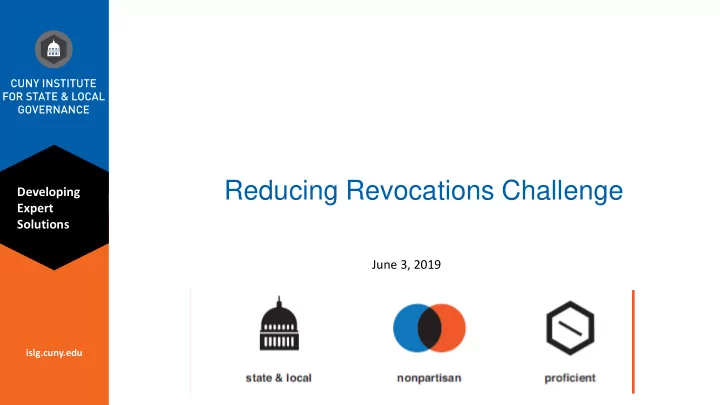

Reducing Revocations Challenge Developing Expert Solutions June 3, 2019 islg.cuny.edu
Agenda • Overview of Reducing Revocations Challenge • Research Parameters and Partnerships • Proposal Content and Evaluation Criteria • Key Dates • Questions
Background • 1 in 55 people in US under community supervision • Revocations are a significant driver of jail and prison admissions • 1 in 3 unsuccessful, 12% end in incarceration • Up to 61% of prison admissions in individual states are due to revocation of probation • Limited knowledge of factors, circumstances, and behaviors that drive revocations to jail or prison and how to effectively respond
Reducing Revocations Challenge • Action research in 10 jurisdictions • Comprehensive analysis of probation revocation drivers • Identification of potential strategies to reduce revocations • 16 month contracts October 1, 2019 – January 31, 2021 • Up to $200,000 to each Action Research Team (ART) • Support and peer learning • Light-touch TA from ISLG and Advisory Board • All-sites conference calls and webinars • Cross-site summit
Research Questions • What are the drivers of probation revocations/supervision failures? • Special emphasis on underlying behaviors and outcomes of violations • Consider the following factors and circumstances (more detail in RFP): • Pathways toward revocation . How do behaviors and decisions at different process points move people toward or away from revocations? • Policy and practice context . How do legal and administrative policies — and the way they are implemented — affect how probation clients move through these pathways? • Individual characteristics . Who is being revoked and how do they differ from the general probation population?
Research Components • Explore key factors, circumstances, and decision points along the revocation process • Four required components • Review of relevant legal and administrative policies and procedures • Quantitative analysis of administrative data • Case file reviews • Interviews with key stakeholders • Identify policy/practice strategy based on findings
Deliverables • Final research design – October 1, 2019 • Draft findings – August 15, 2020 • Draft research report – November 15, 2020 • Strategy proposal – December 15, 2020 • Final research report – January 31, 2021
ART Partnerships • Research organization: lead entity and recipient of award funds • Leads all research activities, including data collection and analysis • Leads development of research report • Participates in peer-learning activities and cross-site summit • Local probation agency or office: active partner in the work • Provides data and guidance to research organization • Leads or co-leads development of strategy proposal • Participates in peer-learning activities and cross-site summit • Optional: additional criminal justice stakeholders
Proposal Content • Cover letter • Proposal narrative • Statement of the problem • Work proposal: research design, measures and data, dissemination strategy • Policy and practice implications • Organizational capacity and experience • Budget • Budget narrative • Appendices, including letters of support
Evaluation Criteria • Statement of the problem – 10% • Work proposal – 50% • Policy and practice implications – 5% • Organizational capacity and experience – 30% • Budget and budget narrative – 5%
Key Dates • June 7, 2019: Last day to submit questions about the RFP to RRC@islg.cuny.edu • June 10, 2019: Addendum posted on ISLG website • June 24: Proposals due by 11:59pm EST at https://cuny- islg.fluidreview.com/ • By August 21: Notification of awards • October 1: Anticipated contract start date
Questions
Questions • Eligibility • What types of community corrections agencies are eligible? (e.g., parole, juvenile vs. adult probation) • Are agencies outside of community corrections eligible? • Can applications focus on evaluating the impacts of specific policies or programs?
Recommend
More recommend